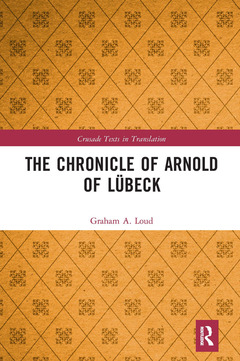Description
The Chronicle of Arnold of Lübeck
Crusade Texts in Translation Series
Author: Loud Graham
Language: English
Subject for The Chronicle of Arnold of Lübeck:
Keywords
Young Men; Celestine III; Crusades; Pope Alexander III; Crusade Texts in Translation; Holy Man; Graham Loud; Book III; Arnold of Lübeck; Emperor’s Son; North Germany; Lord Pope; The Holy Land; King Waldemar; Kings of Denmark; King Cnut; Staufer; Lord Emperor; Welfs; Count Palatine; Ascanians; Lord Archbishop; Arnold’s Chronicle; Innocent III; Pope Innocent III; Otto IV; Helmold’s Chronicle; Lord Pope Innocent; Arnold’s Work; Lord Patriarch; Frederick Barbarossa; Lord King; Papal Judge Delegate; Governor’s Daughter; William’s Father
Publication date: 09-2020
· 15.6x23.4 cm · Paperback
Publication date: 03-2019
· 15.6x23.4 cm · Hardback
Description
/li>Contents
/li>Biography
/li>
The chronicle of Arnold, Abbot of the monastery of St John of Lübeck, is one of the most important sources for the history of Germany in the central Middle Ages, and is also probably the major source for German involvement in the Crusades. The work was intended as a continuation of the earlier chronicle of Helmold of Bosau, and covers the years 1172?1209, in seven books. It was completed soon after the latter date, and the author died not long afterwards, and no later than 1214. It is thus a strictly contemporary work, which greatly enhances its value.
Abbot Arnold?s very readable chronicle provides a fascinating glimpse into German society in the time of the Emperor Frederick Barbarossa and his immediate successors, into a crucial period of the Crusading movement, and also into the religious mentality of the Middle Ages.
Maps
Genealogical Charts
Preface
Abbreviations
Introduction
The Chronicle of Arnold of Lübeck
Book I
Book II
Book III
Book IV
Book V
Book VI
Book VII
Appendix: Frederick II’s Privilege for Lübeck 1226
Bibliography
Index
These books may interest you

Memorials of St Edmund's Abbey 54.78 €



